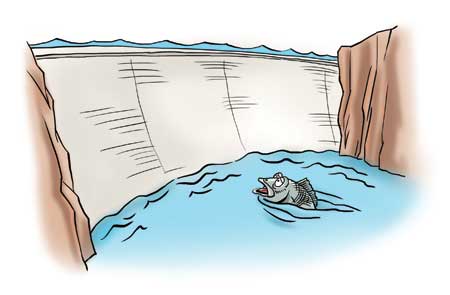Hydropower remains cleanest solution to rural regions
 |
|
[By Liu Rui/Global Times] |
Recently an official at the Ministry of Environment Protection claimed that hydroelectric stations might be more environmentally damaging than conventional thermal power stations.
This reflects a narrow and biased view.
At present the governmental regulations on reducing pollution only examines sulfur dioxide and chemical oxygen demand (COD), a measurement of organic pollutant. It is believed that the building of dams would slow down water flow, exacerbate COD data and cause algae bloom.
But it's not true that slowing the water flow would definitely threaten the water environment. For one thing, it would be much easier for suspended solids to be deposited through sedimentation. For another, slowing the water flow would be much more environmentally sensitive. Industrial pollution would result in much more serious hazards than before. This would force local governments to harshly eliminate those small polluting businesses and build more sewage treatment plants.
As for other ecological concerns, the amount of fish has been continuously declining regardless of dam construction.
Changes in waterways may exert a short-term impact but in long run fish can adapt to the new environment. Overfishing and pollution cause much more damage to marine life than dams.
Dams and reservoirs are actually reducing the risk of geological catastrophes. By slowing down the water flow, rocks along rivers would be less corroded and landslide would also become less likely.
Some fanatic environmentalists misled the public and pressed for irrational policies. Fortunately their techniques don't always prevail. Now policymaking increasingly respects scientific analysis rather than media hype and environmentalists' emotions. Nevertheless, some stubborn environmental fundamentalists, still can influence the public understanding.
Their persistence is explained by how Chinese environmentalist groups work. Most environmentalists receive funding from NGOs, and in return they must present convincing reports about how bad the environment is and how courageously they are fighting against the polluting tycoons.
 0
0 







Go to Forum >>0 Comments